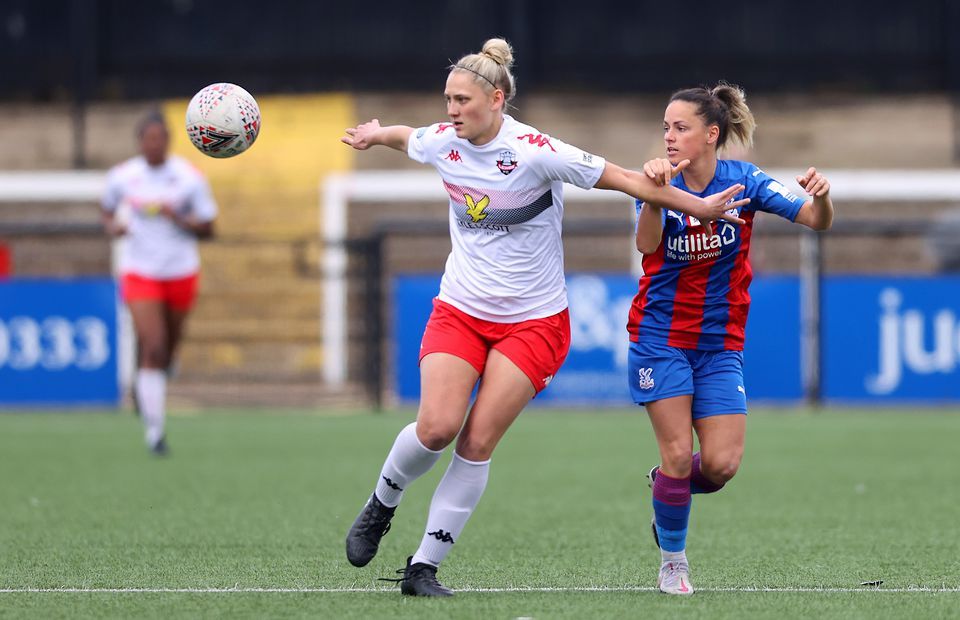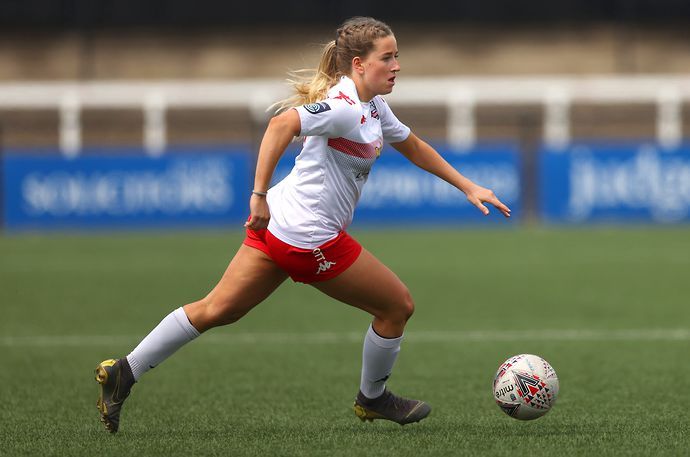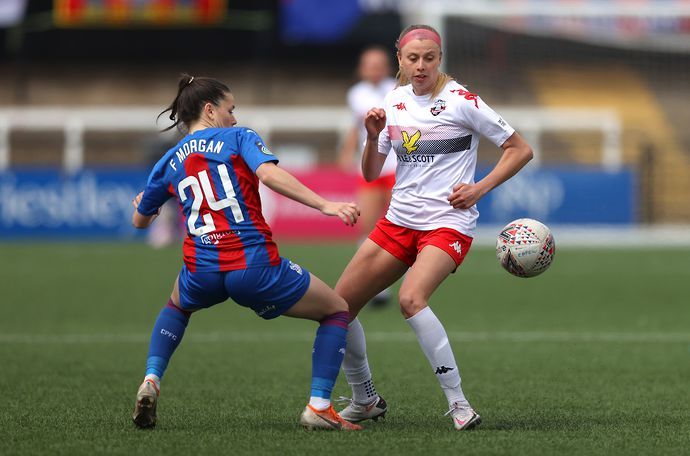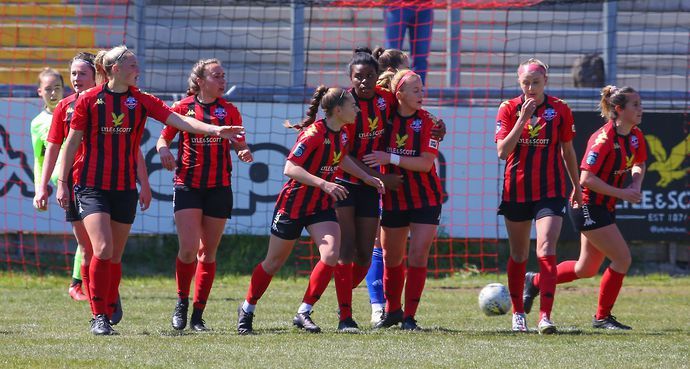In July 2017, Lewes Football Club decided to take a stand.
In a sport where gender equality is almost non-existent, they became the first semi-professional or professional club in the world to pay their men’s and women’s team equally and provide equal resource allocation.
Four years on, and the East Sussex based club have witnessed the success that their ‘Equality FC’ move has brought to the club and the local area of Lewes.
GiveMeSport Women spoke to Lewes’ marketing director Charlie Dobres about the benefits their stand on gender equality has brought, and how fan voices are essential to women’s football as it continues to grow.
“So our move on gender equality, happening on the anniversary – July 8th 2017 – was about giving a signal to football, and beyond football, that gender equality matters,” Dobres says.
“Crucially, as well, it’s a really smart business thing to do,” he continues, “When you do it, and this is true of diversity generally, when you introduce gender equality and diversity, you will have a more successful business.
“We won’t be the only company in the world with that premise but we’re the first one doing it in football.”
That premise has proved successful in many other walks of life, and it’s no different in football. Lewes FC have reaped the rewards.
Attendances quadrupled. Before, an average of 120 people were pushing through the turnstiles to see the Lewes women’s team each week. Now they are getting just under 600, a similar level to what the men’s side are receiving.
Sponsorship too, has been an added bonus: “We attracted lots of new sponsors who pretty clearly would not otherwise have sponsored a men’s non-league football club. But they did want to sponsor what we stood for,” Dobres says.
The golden eagle synonymous with fashion brand Lyle & Scott now sits centrally on the match-day shirts of Lewes FC’s men and women’s teams. The Rooks landed a six-figure sponsorship deal, the largest in the club’s history, in December 2020.
“That was largely due to our stance on gender equality,” Dobres states.
“The majority of our deals that we have been getting recently are strongly, sometimes totally, related to our stance on gender equality because it’s something that people and brands want to associate with and there’s not a lot of clubs doing it.”
More money coming in through the gates and more sponsorship opportunities – what else could you ask for?
Since Lewes FC operates within a fan ownership model, the introduction of Equality FC helped to boost ownership numbers as well. After becoming 100 percent fan owned in 2010, the club now has just over 1700 owners spread across 36 countries.
“If you fully back your women’s team without harming the men’s team – because that isn’t necessary – the hypothesis was that you will have a more successful business, apart from doing a good thing."
Even with this more successful business, Dobres confirms that Lewes FC don’t plan on slowing down any time soon. They want to increase their fan ownership to new heights.
Their ambition is to become the UK’s most owned football club, followed by the small task of becoming the largest fan owned club in the world. This would mean surpassing Barcelona’s 140,000 donors.
With the failed attempt at launching a European Super League fresh in the minds of football lovers, fan ownership has become a hot topic in recent months.
For Lewes and Dobres, the ESL debacle was the perfect example of how fan ownership and strong fan voices are absolutely vital to football as we know and love it.
And fan-led opinions could be the way forward in the women’s game.
Dobres believes it still has the room to grow and steer well clear of the myriad of existing problems within men's football.
“We are very keen that the women’s football structure in England, run by the FA, does not become a mimic or a copy of men’s football, that it doesn’t make the same mistakes and does not, ultimately, become a spare rib of men’s football."
I hand on heart believe that if women’s football is given the time and the space, and frankly, the investment to evolve how it naturally wants to evolve, led by women – then I think you’ll end up producing an awful lot of lessons that men’s football will want to copy.
Currently, however, Lewes and Dobres are fearful that without change, women’s football could fall into the same traps that men’s football did as it grew globally and commercially.
“It will look very similar in the structuring of prize funds and the misallocation of resources to the top level versus the middle and grassroots; and I think that’s entirely to be avoided.”
As more money is injected into the women’s game, there is more opportunity for disparity between clubs at the top of their respective leagues and those at the bottom and into the lower divisions.
There already is a major gap in the Women’s Super League. Last season, the bottom five teams plucked only a single point away from those who finished in the top four.
So what would an increasing chasm between those at the top and those further down mean for Lewes Football Club and its women’s side?
“It would leave us outside the room when the door shuts, and that is something we are very conscious of and we entirely want to avoid.”
The Lewes fan ownership model is something that could give women’s football fans a strong voice to make the improvements in the women’s game and ensure it doesn’t become an exact replica of the men’s.
“Because it [fan ownership] can help any football I think it can absolutely help women's football,” Dobres explains.
“Introducing more fan voices into the women’s game, at this stage where there is still an opportunity to do so, could be a real saving grace.”
Perhaps, however, the biggest positive that Equality FC has ignited is the way in which they have got people talking about gender equality.
“We can see a definite link between the amount of stories that are generated about us, or also on the subject of gender equality because of us initiating the debate,” the Lewes director explains.
“In that time period, we have seen plenty of anecdotal evidence of clubs bringing the women into the training ground, some clubs bringing the women into the main stadium to play, some clubs improving the budget, improving various aspects of it.
“It would be ridiculously hubris to suggest that Lewes are solely responsible for that,” Dobres admits. “But I think it would probably be unrealistic to suggest that we haven’t been a catalyst.”
And that’s what we want to be. We want to be an agent of change. We want to be disruptive and stir things up.
And that is certainly what Lewes are doing. They really are leading the way for better diversity and equality in football, and making the sport we all love better for everyone.

















